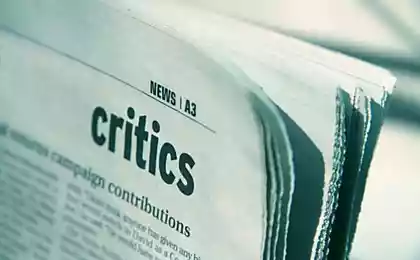654
How to criticize: 10 effective tips
Long ago it was necessary to write this manual. And I literally spent the last year going, every time he met phrases like:
Can no longer remain silent. Write.
People! Thank you very much, that you are not indifferent. It's incredibly cool when someone is so anxious for others that he does not regret the time and knowledge to comments and criticism. It is very valuable, and it's really important. Take care, please, of this concern.
Only that the above is exactly the criticism, you're being cruelly deceived.

What we call criticism and seasoned with all these types of sauces, in fact not even close it is not.
Unfortunately, to criticize all of us are not taught, neither in schools nor anywhere (except that, in the literary University). But we all teach tough and even aggressive attitude to yourself and others. Therefore, under the guise of criticizing a lot of good people trying to shove each other out aggression, resentment, complaint, discomfort, unsolicited advice, a picture, a basket, a piece of cardboard and the little dog. What often makes each other unfairly hurt. But this criticism, which would be stimulated to develop – and which is really needed! in the end, very few. Literally, with flashlights and a shovel must be sought, and it is doubtful that there is.
Let's talk about criticism, about how to do it well and how, if possible, not to do bad — and try to change our world for the better.
So, what is criticism? It is the analysis, evaluation, and parsing of any works, events or product (and even human), indicating improvement opportunities.
What is the purpose of criticism? Oddly enough, but to help its object is to improve yourself or your creation, stimulate to development. Proper criticism gives good feelings and positive motivation, because the object of criticism realizes he's not alone, it helps for the quality of his work survive from the position of "shoulder to shoulder".
Man of Russian culture from the previous paragraph, one usually wants to not only compete, but to smash it to smithereens, because it does not fit. And this is why: the thing is, dear readers, that we grew up in very hard conditions, in which gingerbread was little, and whips – much more than I would like. I mean not so much family (although them too), and the conditions in General, the environment that surrounds us for many years. For this environment typical of massive "incontinence negative affect", that is, the absolute normality of the public reactions of any degree of stiffness on everything, without evaluation is appropriate whether they are adequate.
This, in turn, also have reason:
Unfortunately, basically all these typical representations are skewed and distorted, almost completely or completely does not coincide with a real understanding of criticism and its purposes. I'm sure this can and should be corrected first and foremost – to themselves. In particular, to write the manuals and instructions and share experiences that will help those who want to learn how to criticize otherwise.
Those who does not want to learn, and wants to continue to do what is convenient, I suggest right at this place close the page because to help you can not.
And those who stayed, let's look at two of the most common mistakes that make people of our mentality in the process of criticism.
I. People give their opinion without asking
The idea of response only upon request (to anything) our mentality is also very hard to realize. Tick "default" displayed in the heads so that any manifestation of any person in the environment automatically means that everyone passing by has the undeniable right these symptoms to evaluate, to condemn, something to say about them, to react somehow to the best of their ability and mind. And expect her to listen to him (and even better if you take note of and thank). Also by default the tick box "to be offended, to get angry and to speak out if you do not want to listen (to take thank)".
ALMOST NEVER FAILS TO EXPLAIN THAT IN FACT THE OPPOSITE IS TRUE!
I'm now not sure I will be able to shout. But, see, taste. Still alive hope.
People! If the environment was not a request for your responses, no urge "to criticize," you just should not arise. And certainly, there should be resentment that someone is not interested in your opinion and you as its source. You may have feelings, thoughts and reactions in response to any stimulus. But they are only yours and you can deal with. If they somehow immediately have a vector in the direction of the feedback source of the stimulus, then it doesn't make any sense, right on many points. Work with unhealthy garbage, please, and do not beat them about the other hurl. Hitting will not work.
II. People think criticizing anything, except her
The main reason, as I mentioned – it's a tough environment in which we grew up, and the associated distortion of perception. As a result of the distortions we experience as negative criticism just all in a row – as in your address, and myself.
Here I want to give examples, because it's immediately clear what is meant.
1. I inappropriate messages
Examples:
I don't like I did not help me any information will not be applicable to me, I don't like this, etc.
Why this is not a criticism:
You share some emotion or thought: e.g., violated expectations, shame about the time spent, insight, information, etc. But the person in 95% of cases it is not necessary, uninteresting and useless, because it's about you, not about him and not about his creation. It turns out a bit like a joke — "I Came to say that I did not count."
There is one exception: if you are a typical representative of the audience for whom all this is designed — that your emotions are important, they need to be taken into account. Unfortunately, 9 out 10 "critical" and in this respect are of no interest, which of course is a shame, because something about yourself, I want to talk.
What a man feels when he "criticized" in this way:
Most of all, bewilderment: who are you? But can worry and lose motivation if it is important to please everybody.
How to turn into a correct criticism:
To add, why do you think that the information is about your emotions and reactions can be important. If this add is impossible – not to say anything.
2. Primitive negative rating
Examples:
Bad, awful, no sense, nonsense, rubbish, sediment, and garbage, Yes, this is complete nonsense, etc.
Why this is not a criticism:
Primitive means simple, the first level without straining. There is no benefit from this assessment, no, because it is subjective and too simple, and therefore can not be "included" and cannot be the platform for improvements (nothing refined). Here also applies the above exception: if you are a typical representative of the audience, or, for example, the head criticize your opinion is important. As you can guess, most of the "critics" are neither there nor here, but excited to check all around if this is not too bothering.
What a man feels when he "criticized" in this way:
Resentment, indifference, fatigue, depending on the sensitivity of the estimates to the primitive.
How to turn into a correct criticism:
To complicate things (it will have to strain to reflect on their feelings, to understand what exactly they are called). Please explain why your impressions are important (for example, you – TSA). If your experience uneasy not important, but simply you are bursting – not to say anything.
3. Go to the person
Examples:
All personal insults, accusations, references to any of the information from the personal history of the object "of criticism," a reference to the nature of the object, the assessment of his reaction to all this etc.
Why this is not a criticism:
And again, I must say that this paragraph is the key difference between the Russian-speaking space (unfortunately). "Shame shitty gardener" as a result of the question about the piano, remember? That's exactly it. We do not know how to consider the event, opinion or product in isolation from the personality of the Creator. We sincerely think that everything is connected, and hence, we have the right to discuss a personality like that she put up for evaluation.
In addition, very often the transition to a person is used as a basis to nullify or to thoroughly devalue what the person did, or to bite him where it hurts, finding vulnerable places. A person, no one unable to change, and certainly not everyone wants to do it, so why should it be drag?
Remember a typical example is the prosecution of feminists in injury as the reason for their position, though having a traumatic experience is something shameful and damaging to the position. Feminism in isolation from the personalities of feminists to discuss can very few people.
What a man feels when he "criticized" in this way:
The range is wide depending on the background: surprise, confusion, irritation, anger, shame, powerlessness (yourself cannot be changed, and therefore will remain a target, so perhaps better to do nothing).
How to turn into a correct criticism:
It is very difficult, but possible. To remove all the personality out of it, and examining the product or process in isolation. If it is not impossible to imagine that it was your closest friend, i.e. all former ties with the person that you scratched and stopped working. Then check whether there is still a desire to say something.
4. Aggression
Examples:
Direct aggression — insults, rudeness, indirect, sarcastic and caustic remarks, passive aggression — now what etc.
Why this is not a criticism:
Everything is simple. Aggressive release under the guise of criticism — is an attempt to respond to their anger, envy, discomfort and other emotions using the attack on the object. Emotions can cause the person himself and his creation. Also, emotions might not be relevant to anything "criticize". Easy to guess that any improvement and help the aggression does not contribute, but that's what she does well — so it is a healthy desire to defend or attack in response.
What a man feels when he "criticized" in this way:
Depends on how it can separate itself from what "criticize". If the good separates, will feel regret, anger, surprise. If bad – will feel that it is attacked, to defend and to demetiliruetsa.
How to turn into a correct criticism:
To stop and step back. To try to understand what place you got angry, and what contribution to that anger has made your personal life story (or the story of the relationship with this genre, person, industry). If the place is found, make feedback in the format of "In this moment... I felt/and anger because... I think you/you're important to know, because...". If location not found, leave everyone alone and only deal further with you, because to keep track of random triggers aggression in your direct interests.
5. Hyperexpensive performances
Examples:
Uninvited instructions and lectures as necessary, the theatrical criticisms in the faults, hints, veiled under the questions, familiarity, Forbearance, instructive tone, attempts to use manipulation and "training" (negative and positive reinforcement)
Why this is not a criticism:
First, let me clarify that for me, the word "expertise" does not carry negative value. All of us in some experts, and often share their knowledge with each other without any hierarchy. This paragraph is about redundancy. Giperaktivnosti is a pleasant scratching your CDA, because she is such a "criticism" emphasizes that you know everything much better. In some cases, it is also an attempt to compete or podmenivali (i.e. contains aggression). Your message may include valuable comments (there are some real experts), but all presented in such a form, the goal is not reach, because every person is instantly distracted by the cover. Except when he's a Buddhist, perhaps.
As an example I want to cite the usual (and in most cases unnecessary) position of giperaktivnosti in men compared to women. Any questions. It even has a name – mansplaining.
What a man feels when he "criticized" in this way:
Depends on the severity of his narcissistic part. If it's expressed badly, it will hurt, perhaps wounded, as you'll feel worse and you will feel the shame. If weak – will not notice, laugh or be irritated.
How to turn into a correct criticism:
Leave all of the substantive as it is. To reflect on his true motives, to smooth inflated Ego and completely remove the surplus of expertise. If this is difficult, imagine you're doing a joint project with a colleague, and for the result answer and experience both (but the report fell on him).
6. The requirement of ideality
Examples:
Used the wrong word, the wrong color, it was different, here this little thing spoils everything, that's not very nice, you doing it all wrong, you left out something, too emotionally, and everything else from the "not so stand, not whistle".
Why this is not a criticism:
Usually it is the perfectionism of the viewer. Nitpicking, tend to go to specific small things that are so blatantly "wrong" that the perfectionist becomes almost physically ill. So their fix is more important than the main object, and the focus has shifted. In fact, this requirement of ideality, and ideality in terms of a specific outsider. In order to achieve it, another person to live in your head and know how to do it your way. What is it? Most often, there is no need, it's not the fact that you think better. Although hurt such claims can be – we have an incredibly narcissistic world, where fantasies of the perfect foods, and inability to keep error — poisoned by many.
What a man feels when he "criticized" in this way:
Depends on the severity of his narcissistic and also obsessive part (terrible word!). If they are strong, then he will become "infected" and will feel that all is lost, because the ideal is not achieved and he is not pleased. If weak – will not be affected. You may even try to reassure you, because to look at the suffering of a perfectionist and pretty hard.
How to turn into a correct criticism:
With perfectionism is very difficult to fight, because the basis of it is painful: when something was done well enough, and the consequences cost too much. This trap can then be triggered throughout your life, but other people, of course, nothing to do with it. So criticism is better to draw it as I-messages: "I feel that it is very important to change here... and here...Because...". However, we should remember to claim 1 – whether the other person some information about you and how exactly should do? Also helps to honestly answer the question, however would you be so smart to do what he did the other, better? But at the same time? The usual answer is no, though, because the product of another person – that he is, and you still only spasms from his imperfection. Then maybe better not to say anything.
7. Depreciation
Examples:
Why do you need to do you the grain, and in Soviet times, have lived without it and nothing, it's pointless, that's how much time you've wasted, etc.
Why this is not a criticism:
Oh, this is the main beach all criticized because the message that is contained in devalues the phrase is "actually, you didn't do anything". It's hard to come up with something more devastating. It can't be criticized by definition, as it clears the space for criticism. Why you want to reset other people's results – the big question: sometimes it is the honest opinion of "wish it never happened", sometimes it's disguised aggression and, sometimes, competition, etc. In vast majority of cases, it is also an obvious lie, because if the result is worth nothing really, there was nothing to reset. So the people using the depreciation fall into his own trap: since the energy spent by them, clearly shows the level of significance of the object of "criticism" for them.
What a man feels when he "criticized" in this way:
The depreciation of the narcissistic defense. If the person you are criticizing, there is a pronounced narcissistic part, it either gets infected (that is, begins to worry about his own insignificance), or get hurt.
How to turn into a correct criticism:
This point – in any way. It is best not to say anything, and figure out why you are so drawn to turn something to scratch and to bite someone else's Ego.
8. The requirement of containerbase
Containerevent is the ability to process emotions without suppression, a kind of digestion, which makes them portable.
Examples:
"Loud" (power) messages about their feelings and feelings with details ("I'm gonna puke"), reproaches the occurrence of these feelings, introduce yourself to your victim, the demonstration of "wounds" and issues caused for you, vague cries ("AAAA oooi rrrr ay-ay-ay kapets!") etc.
Why this is not a criticism:
Let me clarify that I don't mean a real relationship, where someone is injured, but only the human reactions to ordinary, simple things that aren't supposed to hurt.
Active demand containerbase, in the absence of a relationship is simply an attempt to put out about another person his burning ass, as either:
1) there is the conviction that it was he to blame for the fire and must help to put out,
2) I want to punish him for his discomfort from the burning sensation (which does not want to deal with on their own).
The mechanism works regardless of the true causes of fire that can be (and often are) deeply personal. As my colleague Pauline Gaverdovsky where took – there and shits, okay, if you have time to take off my pants. Interestingly, often the "victims" spend on this item as much energy as not all of us have (and this is one of the signs that to worry about them not worth it).
What a man feels when he "criticized" in this way:
Some people feel puzzled, because, in fact, they are somehow something left poke, and require something to do with it. Other (giperatidnye, or are prone to guilt) can be induced by and really start to containerevent.
How to turn into a correct criticism:
To remove the shade requirements and take the form of "error report": "I had the feeling that... Perhaps because I feel I'm not alone and if it wasn't your goal, please note".
Is useful for yourself to understand why you have a need or desire to bear your feelings to someone else. If this increased vulnerability and inability to deal with discomfort – after all, this is not the problem of others, and we need to respect that.
9. Far-reaching conclusions
Examples:
Now all is lost; you did it because...; it is discreditied the whole idea; all this is no accident; and also the literary techniques of the type of hyperbole, pseudo-logical calculations, etc.
Why this is not a criticism:
Because it is a personal reflection, as a rule, deeply subjective (although the people who agree with them, and can be grouped). From the most often reminiscent of the paranoia, a failure in thinking or a global conspiracy theory, because to prove his conclusion, the author usually can't. More precisely, he thinks he can, but becomes entangled in the legs and falls. Any improvement in these cries, by definition, can't help – everything is the "kicker" in the head, so you are powerless here.
What a man feels when he "criticized" in this way:
Irritation, anger, bewilderment, indifference, depending on sensitivity to the reactions of others. Stable people can even laugh.
How to turn into a correct criticism:
If you are prone to this, try before you issue a judgment to the outside, to subject it to self, find a "weak link" in his reasoning. A good technique for this — imagine that you need to refute your position, what arguments do you use? Often after domestic dispute turns out to say something and nothing as an undeniable proved to be controversial. If still remain, what to say, give it a thought and talk, "I somehow think that ... what do you think?".
Tired? Nothing, will soon have an end. We reviewed how not to criticize, and why. Now let's get to the important how to criticize. How to make your comments so as not to hurt, not demotivating, not to offend, but support and encourage.
Signs of good criticism:
1. Let's start with something positive and praise him qualitatively. It is important to do this genuinely, i.e. really to find the subject of criticism good and detail write, why you think it is important. False praise is easily recognized.
2. Remove all your negative emotions aside, so as not to trigger protection. Don't suppress feelings at all – just set aside time, as they will disturb you.
3. If your criticism interpretation — use warm reinforcement, positive body language, smile. Let me feel your kindness. If writing is the same, within the limits of the printed text.
4. When you start actually points comment, instead of a pointer offers use I-messages instead of "you are wrong" "I disagree". So you can avoid an accusatory tone.
5. Be as accurate as possible and detailed in the description of the fact, that it is necessary to change and improve. The more detailed the better.
6. Focus on the behavior/product/creation, and not on the man himself. So you save it from feeling "I am a wrong, I'd better go and lie down in the bushes."
7. Try to enter a position to criticize, sincerely try hide someone who has a good job — and not to broadcast how bad things are, from his position. Sometimes after this it becomes clear that some points of your criticism is easier to articulate than done, considering all that is already priced it. And some of you need to do differently than you think.
8. Don't say too much at once. Limit yourself to two or three paragraphs, you can add them, if there is a dialogue.
9. Let us ready-made solutions, i.e. advice on the process, which right away you can take and use. If no ready – to invent at least one, even raw. This will make it easier criticized the task.
10. Be sure to finish with something positive again — praise the high quality and detail. Better than Pat in the beginning and the end, the better it will be perceived that in the middle.
That's all. Those who read this far – well done heroes! There's something I want to wish all the heroes in the end.
Please remember: the purpose of your intervention is to help someone become better, to correct the problem. You don't relax with criticism, you do not work off your stress, you do not scratch your Ego. If you do, stop and think — do you have valid comments, or you just need someone to talk to. If you REALLY want to help make sure that your feedback contains this message. It is very difficult sometimes to separate the important from the secondary, but the best criticism is just, the most conscious and the most elaborate. To criticize it is also the most convenient because it can immediately take over the work. With such criticism, problems and ways of their decision are perfectly clear. At the same time, criticize is not getting "free bonus" in the form of frustration, demotivation and feeling of wrongness.
Take care of each other – and those who criticize (because there's too few people who do something), and those who criticize (because people who really care, in General, a bit).published
Author: Catherine Sigitova
P. S. And remember, just changing your mind — together we change the world! ©
Join us in Facebook , Vkontakte, Odnoklassniki
Source: f3.livejournal.com/106428.html
- "well, you wrote it, so should be ready for criticism",
- "you are not adequately perceive criticism",
- "you take offense to well-deserved criticism",
- "you, apparently, not to criticize, only to praise",
- "I'm just giving you feedback",
- "I want to help you, and you!",
- "it's the Internet, babe."
Can no longer remain silent. Write.
People! Thank you very much, that you are not indifferent. It's incredibly cool when someone is so anxious for others that he does not regret the time and knowledge to comments and criticism. It is very valuable, and it's really important. Take care, please, of this concern.
Only that the above is exactly the criticism, you're being cruelly deceived.

What we call criticism and seasoned with all these types of sauces, in fact not even close it is not.
Unfortunately, to criticize all of us are not taught, neither in schools nor anywhere (except that, in the literary University). But we all teach tough and even aggressive attitude to yourself and others. Therefore, under the guise of criticizing a lot of good people trying to shove each other out aggression, resentment, complaint, discomfort, unsolicited advice, a picture, a basket, a piece of cardboard and the little dog. What often makes each other unfairly hurt. But this criticism, which would be stimulated to develop – and which is really needed! in the end, very few. Literally, with flashlights and a shovel must be sought, and it is doubtful that there is.
Let's talk about criticism, about how to do it well and how, if possible, not to do bad — and try to change our world for the better.
So, what is criticism? It is the analysis, evaluation, and parsing of any works, events or product (and even human), indicating improvement opportunities.
What is the purpose of criticism? Oddly enough, but to help its object is to improve yourself or your creation, stimulate to development. Proper criticism gives good feelings and positive motivation, because the object of criticism realizes he's not alone, it helps for the quality of his work survive from the position of "shoulder to shoulder".
Man of Russian culture from the previous paragraph, one usually wants to not only compete, but to smash it to smithereens, because it does not fit. And this is why: the thing is, dear readers, that we grew up in very hard conditions, in which gingerbread was little, and whips – much more than I would like. I mean not so much family (although them too), and the conditions in General, the environment that surrounds us for many years. For this environment typical of massive "incontinence negative affect", that is, the absolute normality of the public reactions of any degree of stiffness on everything, without evaluation is appropriate whether they are adequate.
This, in turn, also have reason:
- bad boundary at the scale of several generations;
- inability to containerevent own affect and discomfort;
- sacrifice, the willingness to endure, and at the same time, aggressiveness and cruelty (also generations);
- own Inner Critic giant size;
- powerful, multi-layered rationalization (in terms of justification, why is all this necessary – for example, not to be conceited, grow up man, samivinovaty, etc.);
- and other not so pleasant processes, both collective and individual.
Unfortunately, basically all these typical representations are skewed and distorted, almost completely or completely does not coincide with a real understanding of criticism and its purposes. I'm sure this can and should be corrected first and foremost – to themselves. In particular, to write the manuals and instructions and share experiences that will help those who want to learn how to criticize otherwise.
Those who does not want to learn, and wants to continue to do what is convenient, I suggest right at this place close the page because to help you can not.
And those who stayed, let's look at two of the most common mistakes that make people of our mentality in the process of criticism.
I. People give their opinion without asking
The idea of response only upon request (to anything) our mentality is also very hard to realize. Tick "default" displayed in the heads so that any manifestation of any person in the environment automatically means that everyone passing by has the undeniable right these symptoms to evaluate, to condemn, something to say about them, to react somehow to the best of their ability and mind. And expect her to listen to him (and even better if you take note of and thank). Also by default the tick box "to be offended, to get angry and to speak out if you do not want to listen (to take thank)".
ALMOST NEVER FAILS TO EXPLAIN THAT IN FACT THE OPPOSITE IS TRUE!
I'm now not sure I will be able to shout. But, see, taste. Still alive hope.
People! If the environment was not a request for your responses, no urge "to criticize," you just should not arise. And certainly, there should be resentment that someone is not interested in your opinion and you as its source. You may have feelings, thoughts and reactions in response to any stimulus. But they are only yours and you can deal with. If they somehow immediately have a vector in the direction of the feedback source of the stimulus, then it doesn't make any sense, right on many points. Work with unhealthy garbage, please, and do not beat them about the other hurl. Hitting will not work.
II. People think criticizing anything, except her
The main reason, as I mentioned – it's a tough environment in which we grew up, and the associated distortion of perception. As a result of the distortions we experience as negative criticism just all in a row – as in your address, and myself.
Here I want to give examples, because it's immediately clear what is meant.
1. I inappropriate messages
Examples:
I don't like I did not help me any information will not be applicable to me, I don't like this, etc.
Why this is not a criticism:
You share some emotion or thought: e.g., violated expectations, shame about the time spent, insight, information, etc. But the person in 95% of cases it is not necessary, uninteresting and useless, because it's about you, not about him and not about his creation. It turns out a bit like a joke — "I Came to say that I did not count."
There is one exception: if you are a typical representative of the audience for whom all this is designed — that your emotions are important, they need to be taken into account. Unfortunately, 9 out 10 "critical" and in this respect are of no interest, which of course is a shame, because something about yourself, I want to talk.
What a man feels when he "criticized" in this way:
Most of all, bewilderment: who are you? But can worry and lose motivation if it is important to please everybody.
How to turn into a correct criticism:
To add, why do you think that the information is about your emotions and reactions can be important. If this add is impossible – not to say anything.
2. Primitive negative rating
Examples:
Bad, awful, no sense, nonsense, rubbish, sediment, and garbage, Yes, this is complete nonsense, etc.
Why this is not a criticism:
Primitive means simple, the first level without straining. There is no benefit from this assessment, no, because it is subjective and too simple, and therefore can not be "included" and cannot be the platform for improvements (nothing refined). Here also applies the above exception: if you are a typical representative of the audience, or, for example, the head criticize your opinion is important. As you can guess, most of the "critics" are neither there nor here, but excited to check all around if this is not too bothering.
What a man feels when he "criticized" in this way:
Resentment, indifference, fatigue, depending on the sensitivity of the estimates to the primitive.
How to turn into a correct criticism:
To complicate things (it will have to strain to reflect on their feelings, to understand what exactly they are called). Please explain why your impressions are important (for example, you – TSA). If your experience uneasy not important, but simply you are bursting – not to say anything.
3. Go to the person
Examples:
All personal insults, accusations, references to any of the information from the personal history of the object "of criticism," a reference to the nature of the object, the assessment of his reaction to all this etc.
Why this is not a criticism:
And again, I must say that this paragraph is the key difference between the Russian-speaking space (unfortunately). "Shame shitty gardener" as a result of the question about the piano, remember? That's exactly it. We do not know how to consider the event, opinion or product in isolation from the personality of the Creator. We sincerely think that everything is connected, and hence, we have the right to discuss a personality like that she put up for evaluation.
In addition, very often the transition to a person is used as a basis to nullify or to thoroughly devalue what the person did, or to bite him where it hurts, finding vulnerable places. A person, no one unable to change, and certainly not everyone wants to do it, so why should it be drag?
Remember a typical example is the prosecution of feminists in injury as the reason for their position, though having a traumatic experience is something shameful and damaging to the position. Feminism in isolation from the personalities of feminists to discuss can very few people.
What a man feels when he "criticized" in this way:
The range is wide depending on the background: surprise, confusion, irritation, anger, shame, powerlessness (yourself cannot be changed, and therefore will remain a target, so perhaps better to do nothing).
How to turn into a correct criticism:
It is very difficult, but possible. To remove all the personality out of it, and examining the product or process in isolation. If it is not impossible to imagine that it was your closest friend, i.e. all former ties with the person that you scratched and stopped working. Then check whether there is still a desire to say something.
4. Aggression
Examples:
Direct aggression — insults, rudeness, indirect, sarcastic and caustic remarks, passive aggression — now what etc.
Why this is not a criticism:
Everything is simple. Aggressive release under the guise of criticism — is an attempt to respond to their anger, envy, discomfort and other emotions using the attack on the object. Emotions can cause the person himself and his creation. Also, emotions might not be relevant to anything "criticize". Easy to guess that any improvement and help the aggression does not contribute, but that's what she does well — so it is a healthy desire to defend or attack in response.
What a man feels when he "criticized" in this way:
Depends on how it can separate itself from what "criticize". If the good separates, will feel regret, anger, surprise. If bad – will feel that it is attacked, to defend and to demetiliruetsa.
How to turn into a correct criticism:
To stop and step back. To try to understand what place you got angry, and what contribution to that anger has made your personal life story (or the story of the relationship with this genre, person, industry). If the place is found, make feedback in the format of "In this moment... I felt/and anger because... I think you/you're important to know, because...". If location not found, leave everyone alone and only deal further with you, because to keep track of random triggers aggression in your direct interests.
5. Hyperexpensive performances
Examples:
Uninvited instructions and lectures as necessary, the theatrical criticisms in the faults, hints, veiled under the questions, familiarity, Forbearance, instructive tone, attempts to use manipulation and "training" (negative and positive reinforcement)
Why this is not a criticism:
First, let me clarify that for me, the word "expertise" does not carry negative value. All of us in some experts, and often share their knowledge with each other without any hierarchy. This paragraph is about redundancy. Giperaktivnosti is a pleasant scratching your CDA, because she is such a "criticism" emphasizes that you know everything much better. In some cases, it is also an attempt to compete or podmenivali (i.e. contains aggression). Your message may include valuable comments (there are some real experts), but all presented in such a form, the goal is not reach, because every person is instantly distracted by the cover. Except when he's a Buddhist, perhaps.
As an example I want to cite the usual (and in most cases unnecessary) position of giperaktivnosti in men compared to women. Any questions. It even has a name – mansplaining.
What a man feels when he "criticized" in this way:
Depends on the severity of his narcissistic part. If it's expressed badly, it will hurt, perhaps wounded, as you'll feel worse and you will feel the shame. If weak – will not notice, laugh or be irritated.
How to turn into a correct criticism:
Leave all of the substantive as it is. To reflect on his true motives, to smooth inflated Ego and completely remove the surplus of expertise. If this is difficult, imagine you're doing a joint project with a colleague, and for the result answer and experience both (but the report fell on him).
6. The requirement of ideality
Examples:
Used the wrong word, the wrong color, it was different, here this little thing spoils everything, that's not very nice, you doing it all wrong, you left out something, too emotionally, and everything else from the "not so stand, not whistle".
Why this is not a criticism:
Usually it is the perfectionism of the viewer. Nitpicking, tend to go to specific small things that are so blatantly "wrong" that the perfectionist becomes almost physically ill. So their fix is more important than the main object, and the focus has shifted. In fact, this requirement of ideality, and ideality in terms of a specific outsider. In order to achieve it, another person to live in your head and know how to do it your way. What is it? Most often, there is no need, it's not the fact that you think better. Although hurt such claims can be – we have an incredibly narcissistic world, where fantasies of the perfect foods, and inability to keep error — poisoned by many.
What a man feels when he "criticized" in this way:
Depends on the severity of his narcissistic and also obsessive part (terrible word!). If they are strong, then he will become "infected" and will feel that all is lost, because the ideal is not achieved and he is not pleased. If weak – will not be affected. You may even try to reassure you, because to look at the suffering of a perfectionist and pretty hard.
How to turn into a correct criticism:
With perfectionism is very difficult to fight, because the basis of it is painful: when something was done well enough, and the consequences cost too much. This trap can then be triggered throughout your life, but other people, of course, nothing to do with it. So criticism is better to draw it as I-messages: "I feel that it is very important to change here... and here...Because...". However, we should remember to claim 1 – whether the other person some information about you and how exactly should do? Also helps to honestly answer the question, however would you be so smart to do what he did the other, better? But at the same time? The usual answer is no, though, because the product of another person – that he is, and you still only spasms from his imperfection. Then maybe better not to say anything.
7. Depreciation
Examples:
Why do you need to do you the grain, and in Soviet times, have lived without it and nothing, it's pointless, that's how much time you've wasted, etc.
Why this is not a criticism:
Oh, this is the main beach all criticized because the message that is contained in devalues the phrase is "actually, you didn't do anything". It's hard to come up with something more devastating. It can't be criticized by definition, as it clears the space for criticism. Why you want to reset other people's results – the big question: sometimes it is the honest opinion of "wish it never happened", sometimes it's disguised aggression and, sometimes, competition, etc. In vast majority of cases, it is also an obvious lie, because if the result is worth nothing really, there was nothing to reset. So the people using the depreciation fall into his own trap: since the energy spent by them, clearly shows the level of significance of the object of "criticism" for them.
What a man feels when he "criticized" in this way:
The depreciation of the narcissistic defense. If the person you are criticizing, there is a pronounced narcissistic part, it either gets infected (that is, begins to worry about his own insignificance), or get hurt.
How to turn into a correct criticism:
This point – in any way. It is best not to say anything, and figure out why you are so drawn to turn something to scratch and to bite someone else's Ego.
8. The requirement of containerbase
Containerevent is the ability to process emotions without suppression, a kind of digestion, which makes them portable.
Examples:
"Loud" (power) messages about their feelings and feelings with details ("I'm gonna puke"), reproaches the occurrence of these feelings, introduce yourself to your victim, the demonstration of "wounds" and issues caused for you, vague cries ("AAAA oooi rrrr ay-ay-ay kapets!") etc.
Why this is not a criticism:
Let me clarify that I don't mean a real relationship, where someone is injured, but only the human reactions to ordinary, simple things that aren't supposed to hurt.
Active demand containerbase, in the absence of a relationship is simply an attempt to put out about another person his burning ass, as either:
1) there is the conviction that it was he to blame for the fire and must help to put out,
2) I want to punish him for his discomfort from the burning sensation (which does not want to deal with on their own).
The mechanism works regardless of the true causes of fire that can be (and often are) deeply personal. As my colleague Pauline Gaverdovsky where took – there and shits, okay, if you have time to take off my pants. Interestingly, often the "victims" spend on this item as much energy as not all of us have (and this is one of the signs that to worry about them not worth it).
What a man feels when he "criticized" in this way:
Some people feel puzzled, because, in fact, they are somehow something left poke, and require something to do with it. Other (giperatidnye, or are prone to guilt) can be induced by and really start to containerevent.
How to turn into a correct criticism:
To remove the shade requirements and take the form of "error report": "I had the feeling that... Perhaps because I feel I'm not alone and if it wasn't your goal, please note".
Is useful for yourself to understand why you have a need or desire to bear your feelings to someone else. If this increased vulnerability and inability to deal with discomfort – after all, this is not the problem of others, and we need to respect that.
9. Far-reaching conclusions
Examples:
Now all is lost; you did it because...; it is discreditied the whole idea; all this is no accident; and also the literary techniques of the type of hyperbole, pseudo-logical calculations, etc.
Why this is not a criticism:
Because it is a personal reflection, as a rule, deeply subjective (although the people who agree with them, and can be grouped). From the most often reminiscent of the paranoia, a failure in thinking or a global conspiracy theory, because to prove his conclusion, the author usually can't. More precisely, he thinks he can, but becomes entangled in the legs and falls. Any improvement in these cries, by definition, can't help – everything is the "kicker" in the head, so you are powerless here.
What a man feels when he "criticized" in this way:
Irritation, anger, bewilderment, indifference, depending on sensitivity to the reactions of others. Stable people can even laugh.
How to turn into a correct criticism:
If you are prone to this, try before you issue a judgment to the outside, to subject it to self, find a "weak link" in his reasoning. A good technique for this — imagine that you need to refute your position, what arguments do you use? Often after domestic dispute turns out to say something and nothing as an undeniable proved to be controversial. If still remain, what to say, give it a thought and talk, "I somehow think that ... what do you think?".
Tired? Nothing, will soon have an end. We reviewed how not to criticize, and why. Now let's get to the important how to criticize. How to make your comments so as not to hurt, not demotivating, not to offend, but support and encourage.
Signs of good criticism:
- it comes from the position of "shoulder to shoulder with the author";
- she is respectful, that is, takes into account the work of another person and/or the result of this work;
- it motivates you to change;
- it is insight (insight) on how to improve something;
- it does not hurt self-esteem. Ideally, no, because there can be no need to hurt someone else's Ego to convey his thoughts.
1. Let's start with something positive and praise him qualitatively. It is important to do this genuinely, i.e. really to find the subject of criticism good and detail write, why you think it is important. False praise is easily recognized.
2. Remove all your negative emotions aside, so as not to trigger protection. Don't suppress feelings at all – just set aside time, as they will disturb you.
3. If your criticism interpretation — use warm reinforcement, positive body language, smile. Let me feel your kindness. If writing is the same, within the limits of the printed text.
4. When you start actually points comment, instead of a pointer offers use I-messages instead of "you are wrong" "I disagree". So you can avoid an accusatory tone.
5. Be as accurate as possible and detailed in the description of the fact, that it is necessary to change and improve. The more detailed the better.
6. Focus on the behavior/product/creation, and not on the man himself. So you save it from feeling "I am a wrong, I'd better go and lie down in the bushes."
7. Try to enter a position to criticize, sincerely try hide someone who has a good job — and not to broadcast how bad things are, from his position. Sometimes after this it becomes clear that some points of your criticism is easier to articulate than done, considering all that is already priced it. And some of you need to do differently than you think.
8. Don't say too much at once. Limit yourself to two or three paragraphs, you can add them, if there is a dialogue.
9. Let us ready-made solutions, i.e. advice on the process, which right away you can take and use. If no ready – to invent at least one, even raw. This will make it easier criticized the task.
10. Be sure to finish with something positive again — praise the high quality and detail. Better than Pat in the beginning and the end, the better it will be perceived that in the middle.
That's all. Those who read this far – well done heroes! There's something I want to wish all the heroes in the end.
Please remember: the purpose of your intervention is to help someone become better, to correct the problem. You don't relax with criticism, you do not work off your stress, you do not scratch your Ego. If you do, stop and think — do you have valid comments, or you just need someone to talk to. If you REALLY want to help make sure that your feedback contains this message. It is very difficult sometimes to separate the important from the secondary, but the best criticism is just, the most conscious and the most elaborate. To criticize it is also the most convenient because it can immediately take over the work. With such criticism, problems and ways of their decision are perfectly clear. At the same time, criticize is not getting "free bonus" in the form of frustration, demotivation and feeling of wrongness.
Take care of each other – and those who criticize (because there's too few people who do something), and those who criticize (because people who really care, in General, a bit).published
Author: Catherine Sigitova
P. S. And remember, just changing your mind — together we change the world! ©
Join us in Facebook , Vkontakte, Odnoklassniki
Source: f3.livejournal.com/106428.html
Talk to your car: how Your computer and phone know what You want them to do
6 lots of facts about Why spicy food is good for You























